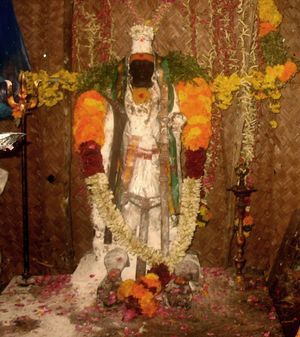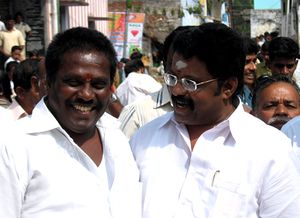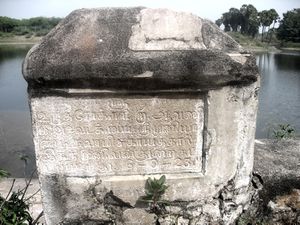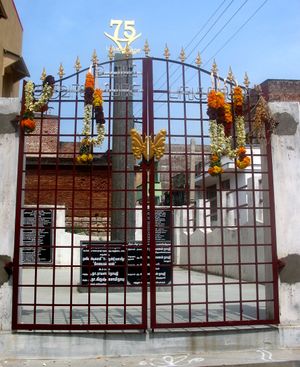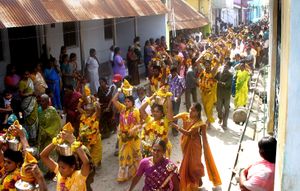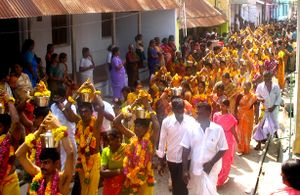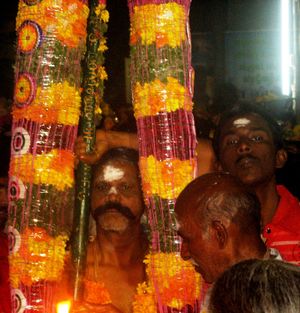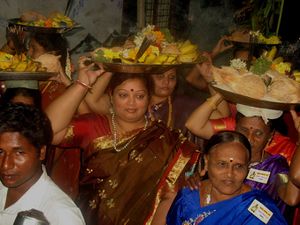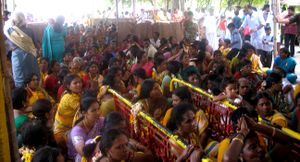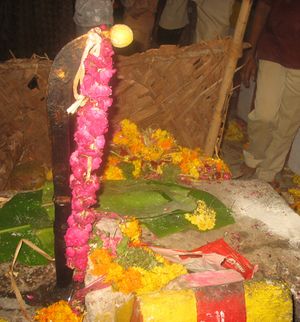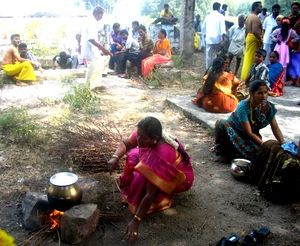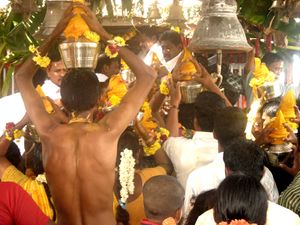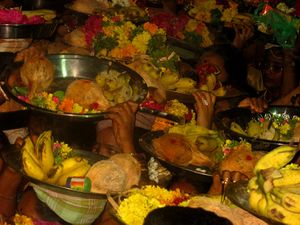Talk:Velama Naidu Jati
By S.V. Badri
Such is the power of jati dharma.
Muniyandi, is the grama devata (billage deity) of the Telugu Velama Naidu Jati.
Sri Muniyandi Swamy’s kshetra spans 53 villages in a district in Tamil Nadu. This deity's presence is so strong in the hearts of his devotees that entire families, parents, children, et al, come annually to pay obeisance.
This jati is most well known for running the largest chain of hotels owned by members of one jati in the world - the Madurai Sri Muniyandi Vilas Chain of Hotels, founded by members of the Telugu-speaking Velama Naidu jati.
It all started in Vadakampatti, a sleepy, rain-fed, almost barren village 15 kms before Virudunagar and 35 five kms from Madurai. With no rains and depleting livelihoods, they found sustenance difficult and most of the people migrated to Madurai and elsewhere. However, Subba Naidu had a strange attachment to his village, married into the most affluent family of the village, and was good at only one thing: dreaming.
Muniyandi Swami – The Origin[edit]
Sri Muniyandi Swami, grama devata, is the ishta devata (beloved, personal deity) of 53 villages across the Madurai-Virudunagar highway. The Telugu Velama Naidus are the predominant jati in Vadakampatti village. In 1935, Subba Naidu knew nothing about the power of this grama devata. His family’s kula devata (family deity) was the presiding deity of the Sri Vaishnava Mandir, Sri Azhagar Swami of Madurai, who is worshiped as the elder brother of Madurai’s own Sri Meenakshi Amman.
Subba Naidu began to have dreams of a man who came in his dreams and vanished before he could realize who He was. He suspected it was Muniyandi, the Protector his mother always spoke about in his childhood. Muniyandi was playing games with him, disappearing each time he opened his eyes. His time was spent either eating or dreaming on the steps of the pond where there was no temple. Having married into a wealthy family, he became indolent, but pressure at home mounted as his mother-in-law chided him to make his life fruitful. After one intolerable argument, he sought solace in his favorite vocation - dreaming - on the steps of the village pond.
That night, Muniyandi came in his dreams. Absolute black and resplendent in all His glory, and in a gruff voice commanded. “Subba, tomorrow morning you will see a white horse. Follow it where it leads you, and stop where it stops, to start your first eatery. I shall be there not only to protect you, but also those who follow you into this profession. But you will remember to provide Annadanam (food without cost) to those in need without fail”.
Subba Naidu woke up with a start. Astonishingly, he found a Muniyandi Vigraha on the banks of the pond he often loitered around. He set up the Vigraha, performed the few pujas he knew, and took his wife and mother-in-law into confidence regarding the Divine encounter. Then, borrowing (what was at that time, a princely sum) Rs. 500 from his mother-in-law, he waited near the village pond the next morning.
Just as he finished taking the blessings of Sri Muniyandi, he saw a vision of a white horse in front of him. It whined; he heard - On the mark, Get Set, Go – and pleaded that he could not run fast. The horse nodded and started a mild gallop. Subba followed it from the village of Vadukampatti to Karaikudi, approximately three hours away by current busing standards. After approaching a building at Karaikudi, the horse disappeared. Subba went in and stuck a deal for lease of what is now, the first of the Madurai Sri Muniyandi Vilas Hotels. Today, there are 850 Madurai Sri Muniyandi Vilas Hotels throughout India, and one in China and one in Dubai.
Strength of Jati Dharma[edit]
Within a year, Puducherry and Villupuram appeared on the Muniyandi Map, with Chennai, Cuddalore, Thiruvannamalai following suit. The mouth watering biryani was introduced the next year. The first buffet system in the world was started by the Madurai Sri Muniyandi Vilas Hotels. Subba Naidu used to carry a tray with various non-vegetarian dishes in small plates to each of his diners and invite them to pick up what they preferred to eat. He would then go and bring the hot chosen dish and serve the diner.
Subba Naidu returned to his village to pay obeisance to Muniyandi. He then handpicked the families that needed his help and set for them similar eateries in various parts of Tamil Nadu. And so this jati discovered its dharma. Each beneficiary started funding others keen to run an eatery but without resources or logistical support. The Madurai Sri Muniyandi Vilas Naidu Sangam was born to support private enterprise of the jati. The dream of Subba Naidu is today a reality as perhaps the world’s largest chain of hotels owned by one jati – the Telugu Velama Naidus.
76 Years of Annadanam: A Tribute to Muniyandi[edit]
It was 76 years ago, on the third Friday of the Tamil month of Thai (third
Friday of January), that Subba Naidu started the most memorable festival for
Muniyandi – the Festival of Annadanam, known today as Annadana Puja for
Muniyandi. It has never been interrupted. For two days, the people of the 53
villages congregate at Vadakampatti, the place of Muniyandi’s appearance,
with their families, especially those who own hotels in His name throughout
the country. And for 24 hours on these two days, there is Annadanam for all.
Serpentine queues form outside the makeshift tents and as in the
rajasuyayagna of Yudhistira, no one is turned back at any time of the day or
night. People from all jatis, rich and poor alike, sit next to each other to
eat the sumptuous Annadanam. There is no jumping of the queue. Enthusiastic
men and women serve the diners on thalai vazhai ilai (plantain leaves),
always asking each diner if they could serve a little more.
Third Friday, Thai Masam (mid-Jan to mid-Feb)[edit]
Women, men and children carry milk or tender coconut water on their heads to perform abhishekam to Muniyandi. The procession takes three hours to reach a destination barely half a kilometer from the heart of the village. The tharai, thambhattai, the famous music Sivamani picked up from such villages to splash on TV following Chennai Super Kings; roars in rhythmic glory. As boys of all ages dance in front of the procession, the village nadaswaram follows, with tavil in attendance. Some women get into “sami attam”, a stage of hysterical dance. But these are no ordinary village women, each is the wife of a millionaire, and would normally be reticent in their hometowns and cities. This is the first half of the two day ritual. After abhishekam and the mahadeeparadhana, they return to their ancestral homes that each family feels privileged to maintain in the village, to smell the native soil and be part of their own God’s festivities. This is followed by annadanam.
The Evening[edit]
In the evening, the rituals are exclusive to womenfolk. At front of each home, the women gather with coconut, beetle leaves, fruits and flowers, spread in a tray and placed on their heads with great reverence, to give thanks to their protector. The procession starts from the last house of the village and as it moves forward, people from the households join in. Village belles showcase their “Oyil Attams” in front of the procession. Fireworks light the sky as the procession proceeds to Sri Muniyandi/Sri Karuppannaswamy Mandir. A huge garland is carried with great devotion and offered to Sri Muniyandi.
As in every village festival, there is a music session in the evening,
preceded by a small meeting. Subba Naidu’s great-grand children are called to the stage and
honored to this day.
Vegetarian and Non-Vegetarian[edit]
Sri Muniyandi, in whose name there are 850 non-vegetarian hotels throughout India, is considered a vegetarian and the prasad made for him is sweet pongal. Women with a vow to fulfill prepare sweet pongal for him. Muniyandi’s fellow-protector, Sri Karuppannaswamy, the co-grama devata, needs non-vegetarian fare.
So on the first day of the festivities, for Muniyandi, the entire villages become vegetarian. On the second day, for Sri Karuppannaswamy, the fare becomes totally non-veg.
People with desires make a wish to Karuppannaswamy, who resides outside the Muniyandi premises. Each year, nearly 200 goats and 60 chickens are sacrificed by those whose desires have been fulfilled. That night, villagers from the 53 villages sleep outside the mandir premises, with gigantic queues forming to take the biryani prasad made from the animal sacrifices.
A Handful of Mud[edit]
The Velama Naidus belonging to these 53 villages have taken a handful of village mud and built Sri Karuppannaswamy Muniyandi Mandirs in their villages. But as this is the original village of Muniyandi, they make it a point to participate in the celebrations in the month of Thai, and celebrate festivals in their own villages in the months of March and April. In these villages, everyone is embraced as a relative, and it is common to be addressed as Bava (brother-in-Law), Mappillai (son-in-law), Chithappu (uncle) or Mama (maternal Uncle).
Marriages[edit]
Marriages are necessarily within the jati dharma, and each family willingly comes forward to help their brethren who need help at the time of marriage or setting up new hotel ventures. There is no distinction between rich and poor for intra-jati marriages. The daughter of a not-so-affluent hotel owner will be welcomed into a rich and prosperous Muniyandi hotel owner’s home. The logic is – Mana Naidu Bava, Manamu Help Cheyaali – we have to help our Naidu brothers.
References[edit]
- Interviews with senior and influencial members of the community in Vadakampatti
- Interviews with the grand son of the first hotel in Pondicherry, the existing hotel owner of Tiruvannamalai
- Interviews with the descendants of Shri Subba Naidu.
- Interviews with the family of late Ramakrishna Naidu of Madurai (who would easily have helped conduct some 1500 marriages of the Velama Naidu community). His three sons who run three massive lodging houses apart from the most popular RK Bakery.
- The stone carving on the ponds near which Subba Naidu used to spend most of his time. The inscription dates back to 6/9/1923, and says that the steps were constructed under the Blessings of Sri Muniyandi Swamy. The Vigraha, however showed up much later in 1935.
- This article was originally published as "Sri Muniyandi: The 1 M who beat the 4 M" on Vijayvaani on Feb 6, 2011

